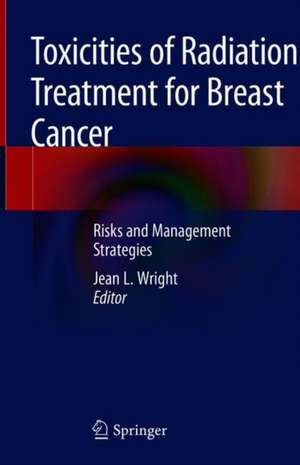Toxicities of Radiation Treatment for Breast Cancer: Risks and Management Strategies
Editat de Jean L. Wrighten Limba Engleză Paperback – 27 mar 2019
Preț: 454.52 lei
Preț vechi: 478.44 lei
-5% Nou
Puncte Express: 682
Preț estimativ în valută:
86.98€ • 93.00$ • 72.52£
86.98€ • 93.00$ • 72.52£
Carte tipărită la comandă
Livrare economică 14-19 aprilie
Preluare comenzi: 021 569.72.76
Specificații
ISBN-13: 9783030116194
ISBN-10: 3030116190
Pagini: 180
Ilustrații: XII, 197 p. 15 illus., 12 illus. in color.
Dimensiuni: 155 x 235 mm
Greutate: 0.27 kg
Ediția:1st ed. 2019
Editura: Springer International Publishing
Colecția Springer
Locul publicării:Cham, Switzerland
ISBN-10: 3030116190
Pagini: 180
Ilustrații: XII, 197 p. 15 illus., 12 illus. in color.
Dimensiuni: 155 x 235 mm
Greutate: 0.27 kg
Ediția:1st ed. 2019
Editura: Springer International Publishing
Colecția Springer
Locul publicării:Cham, Switzerland
Cuprins
1. Including Toxicity Risk in Balanced Clinical Decision Making.- 2. Acute and Late Skin Toxicity from Breast Radiation.- 3. Fatigue Associated with Radiation Treatment for Breast Cancer.- 4. Pain Associated with Radiation Treatment for Breast Cancer.- 5. Considerations for Post-Mastectomy Radiation Therapy in the Setting of Breast Reconstruction.- 6. Lymphedema After Breast Cancer Treatment.- 7. Cardiotoxicity Associated with Radiation for Breast Cancer.- 8. Second Malignancies after Radiation for Breast Cancer.- 9. Tissue Fibrosis after Radiation Treatment for Breast Cancer.- 10. Pulmonary Toxicity Associated with Radiation Treatment for Breast Cancer.- 11. Integrative Methods for Management of Toxicities Associated with Radiation Treatment for Breast Cancer.
Recenzii
“This book is written principally for radiation oncologists, physician extenders, and nurses, according to the preface, and it meets their needs. In my own practice, I think a first read cover‐to‐cover is an excellent review of some literature that is well known and often quoted and other, more heterogenous literature where there isn't consensus on the risk factors for the toxicity or how best to manage. … This is a high‐yield, high‐quality book.” (Laura Warren, Doody's Book Reviews, August 23, 2019)
Notă biografică
Jean L Wright, MD is Associate Professor of Radiation Oncology at Johns Hopkins University. Dr. Wright is also the Director of the Breast Cancer Program in the Department of Radiation Oncology. Dr. Wright is a co-lecturer and teacher for content related to breast radiation oncology and has mentored numerous students. She earned the Association of Radiation Oncology Residents' Educator of the Year award. Dr. Wright is also an associate editor for the breast section of the International Journal of Radiation Oncology, Biology and Physics, as well as a journal reviewer for American Journal of Clinical Oncology, Breast Cancer Research and Treatment, Journal of Clinical Oncology, Practical Radiation Oncology and Advances in Radiation Oncology.
Textul de pe ultima copertă
This book is a comprehensive guide to breast toxicity. Adjuvant radiation remains standard for a majority of women who undergo breast-conserving surgery for breast cancer, and indications for post-mastectomy and regional lymph node irradiation have also broadened with recent publications. At the same time, locoregional recurrence has declined and survival has improved in recent decades. In the current era of excellent breast cancer outcomes, then, considering the balance between toxicity and outcomes becomes paramount. Several recent editorials recommend considering toxicity against the potential benefit of adjuvant radiation in tailoring radiation decisions for individual patients. Thus, a clear understanding of the potential toxicities of adjuvant radiation for breast cancer is critical to optimizing outcomes in modern breast cancer management. Here, authors have collected recent data focused on toxicity of treatment that provide an opportunity for improving this optimization. Chapters cover both acute and late toxicity of radiation for breast cancer, including tailored risk assessment for each of these potential toxicities, considerations for including risk of toxicity in management decisions, and toxicity management strategies. This is an ideal guide for radiation oncologists, residents, and oncologists seeking to optimize care for their patients.
Caracteristici
Offers a comprehensive resource on breast toxicity Guides treatment recommendations for breast cancer to reduce breast toxicity Details evidence-based management techniques for toxicity symptoms
